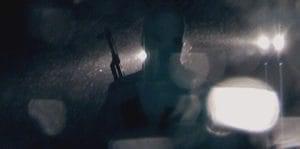
Following the terrorist attacks on September 11, 2001, the United States was soon embroiled in the War on Terror. Still being fought across the globe to this day, this ill-defined conflict was predominantly waged in Afghanistan where the mastermind of 911, Osama Bin Laden, was thought to be hiding and in Iraq which the Bush’s administration mistakenly claimed was amassing weapons of mass destruction to attack the west. 15 of the 19 attackers on that fateful day came not from Afghanistan or Iraq but from one of the U.S.’s closest ally in the Middle East, Saudi Arabia. Director Jonathan Hacker’s harrowing new documentary Path of Blood takes a battlefield view of the Saudi government’s efforts to ferret out and purge the nation of its own violent Al-Queda terrorist cells. With its use of captured Al-Qaeda video footage, the film provides an up close and brutal portrait of the attacks wrought by these young men, their bloody battles with Saudi security services, and the ceaseless indoctrination of that turned these young men into a suicidal path of murder and violence.
A filmic counterpoint to of another gritty War on Terror documentary, Tim Hetherington and Sebastian Junger’s heart-wrenching Restrepo (2010), Path of Blood establishes the scene with a title card announcing that “this is the story of one those countries (besieged by Al Queda). Saudi Arabia: The Land of the Two Mosques.” With this rather blunt opening, I feared that this was going to be a less than nuanced examination of this complex conflict. However, from the opening scene — which showed a dim-witted would-be suicide bomber goofing around in front of the camera and flubbing his last message to the living — my concerns were eased.

“…a battlefield view of the Saudi government’s efforts to ferret out and purge the nation of its own violent Al-Queda terrorist cells.
The film focuses on the time period predominantly between 2003 and 2007 when the Saudi Al-Queda terrorist cells were most active and their fight with security forces was the most intense. The film unfolds very linearly with Al-Queda members preparing and carrying out horrifying attacks on “hard” and “soft targets” — homes of guest workers, a traffic operations center, the American Embassy, the attempted assassination of high ranking security official — and the pursuit by Saudi security forces. New leaders of the different cells arise and are cut down only to be replaced by others, like the Hydra of ancient Greek legend. At times the mood from scene to scene is jarring: in one shot a child’s shattered, lifeless body is pulled from a bombed building and in the next, like kids playing war, would-be-martyrs are wrestling and shooting at targets from a moving car.
But, as the film progresses, and the murderous terrorist attacks and subsequent battles with security forces continue unabated, the horror builds. One particular scene, in which a group of terrorists brutally interrogate a captured American contractor, unnerved me to the core. What elevates Path of Blood above a mere rote retelling of a far-flung conflict which was has since subsided, is how deftly the filmmaker knits in the footage filmed by the Al-Queda members themselves with other source material. By doing so, the filmmaker both humanizes these young men — some of them boys really — who seem like lost souls in search of some ill-defined adventure while at the same time magnifying their pitiless violence and zealotry, not an easy feat. In one such scene, a black-clad and hooded Al-Queda leader with the nom-de-guerre “Marquin” explains how he was trained in Afghanistan, then went on to fight Yemen, Somalia, Bosnia, again in Afghanistan, and then Saudi Arabia, “the land of two holy mosques,” referring to the mosques in Mecca and Medina. This simple speech should be viewed by anyone interested in the seemingly ceaseless War on Terror as it was a full-throated testament to the failed foreign policies of the late 20th and early 21st Centuries.

“…the filmmaker knits in the footage filmed by the Al-Queda members themselves with other source material.”
I have to believe that Hacker, a journey filmmaker who has directed the TV documentaries Britain’s First Suicide Bombers and The New Detectives: Case Studies in Forensic Science, found a kindred spirit in his Executive Producer Mark Boal who was the writer of both The Hurt Locker and Zero Dark Thirty.
If there’s any criticism to be leveled at the film it would be that the narrative stops rather abruptly, essentially when the last major Al-Queda cells are routed by Saudi security forces in 2007. We do learn that some of the remaining fighters have made their way to Yemen were open war currently rages. However, I found myself wanting an epilogue of sorts, especially with the young Al-Queda members who we see being weaned off radicalism and deprogrammed by the Saudi government. What is their mindset ten years later, when the U.S. is awash in xenophobia and Trump’s Muslim ban is now legally sanctioned? Is another conflict in the region imminent or has violent, radical dissent been truly snuffed out? One way or another, we will surely find out.

Path of Blood (2018) Directed by Jonathan Hacker.
7 out of 10 stars

